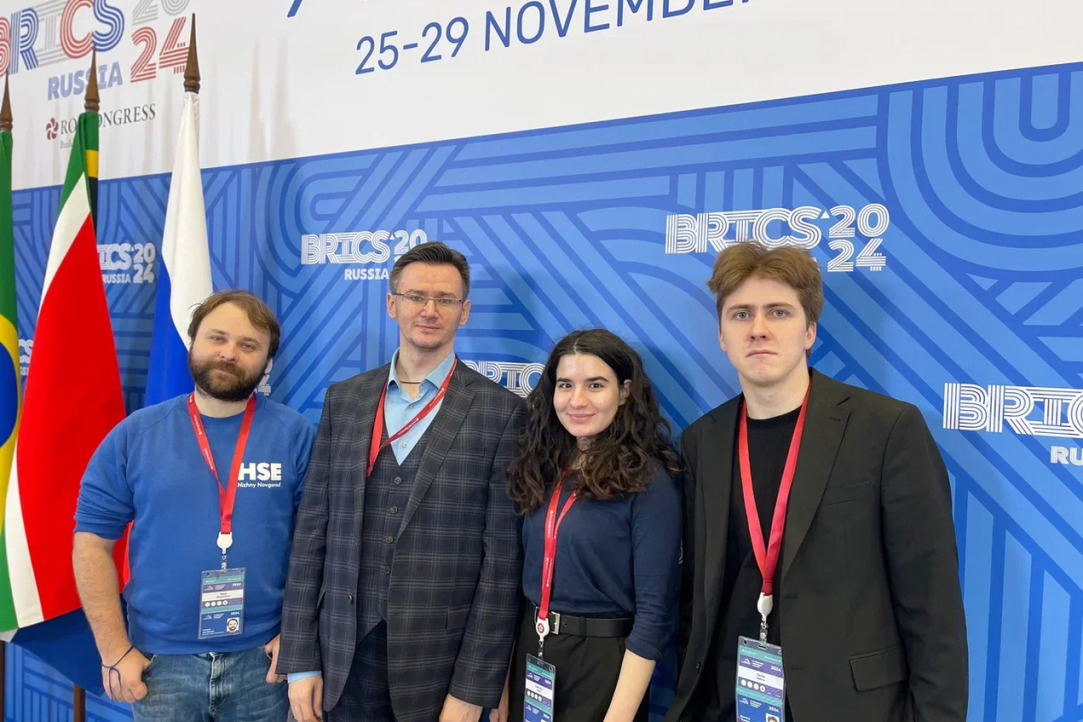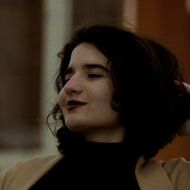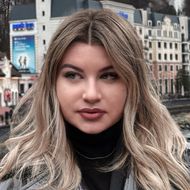The Future Through the Eyes of Young Scientists

A delegation of teachers and students from the HSE Campus in Nizhny Novgorod participated in the IV Young Scientists Congress and the IX BRICS Young Scientists Forum held in Sochi. These two key events of the Russian Decade of Science and Technology brought together representatives of the academic and university community, state corporations, private businesses, and public organisations to envision the future of Russian science through the lens of the younger generation.

This year, the Young Scientists Congress was held alongside the BRICS Young Scientists Forum—a combination of two large-scale events. Was this a good idea? It turned out to be quite effective, and here is why:
- opportunities for collaboration and building partnerships significantly increased
- Russian science was showcased to the global community in the most favourable light
At the Forum’s ‘Digital Humanities’ section, Anna Khomenko gave a presentation dedicated to a complex task set for HSE University researchers by psychiatrists from PRMU (Privolzhsky Research Medical University). The task involved creating stimulus materials for diagnosing auto- and hetero-aggressive tendencies in human behaviour using eye-tracking methods. Based on data regarding gaze fixation on specific elements of the material or the deliberate avoidance of certain components, conclusions are drawn about the presence or absence of psychological accentuations in respondents.
‘It is a great responsibility to represent HSE University. At this stage, it was very important for us to receive feedback from the global community, to find like-minded individuals and work together to make our environment more comfortable. My presentation sparked lively discussions, many questions in the conference hall, and engaging conversations in informal settings. And that is wonderful! If even colleagues from BRICS countries notice that we are doing something unique, it means we truly are. Several potential collaborations have already emerged.
With colleagues from India, we will explore the topic of personal data storage and encryption. With our counterparts in Brazil, we plan to develop research on diagnosing mental disorders based on speech production and perception. They are training neural networks to diagnose Alzheimer’s disease through speech. Their goals are quite similar to ours: preventive, early diagnosis. With colleagues from China, we will work on a project related to social media, starting with TikTok,’ said Anna Khomenko.
The programme of the Young Scientists Congress also focused on constructive, equal, and mutually beneficial international partnerships in the scientific field. The main theme of this year’s congress was the priorities of Russia's scientific and technological development.
Plenary sessions were conducted in a dialogue format between talented young scientists and mentors. The speakers included authors of ground-breaking scientific and technological innovations, as well as leaders of high-tech companies. Young scientists shared insights into their research and stories of professional success, while mentors assessed the relevance and potential of their projects, offered sound advice for effective investment strategies, and provided tools for support.

Boris Ulitin, Academic Supervisor of the ‘Business Informatics’ and ‘Computer Science and Technologies’ programmes
‘The Young Scientists Congress is not just a platform or an event in a researcher’s calendar; it is the essence of experience, opportunities, and connections that can become a reliable foundation for a future scientific career. This year, the congress not only brought together scientists from across Russia but also served as a meeting ground for researchers from BRICS countries, thereby intensifying international cooperation across various scientific fields. Such events undoubtedly unite the scientific community and bring together young researchers from diverse disciplines, enabling us to stay at the forefront of cutting-edge knowledge and technology. It is only through collaboration that we can tackle the major challenges posed by the multitasking nature of modern scientific and technological development.’
In the programme track dedicated to Russia’s Decade of Science and Technology, the results of 2024 initiatives were summarised. These initiatives aimed to popularise science, engage young people and children in research, develop scientific volunteering, and promote science-focused tourism.

Timur Khusyainov, Deputy Dean of the Faculty of Humanities at HSE-Nizhny Novgorod
Attending the Young Scientists Congress has become a cherished tradition—it is a space for meeting and interacting with colleagues from across the country, exchanging opinions, ideas, and new literature. It is great that this year saw active participation from volunteer and youth-oriented initiatives. This shift towards younger participants is encouraging.
The congress’s cultural and scientific-entertainment programme featured film screenings with discussions, music and technology quizzes, a karaoke battle, the University League Science Battle finals, the Night of Scientific Failures, and the intellectual game ‘What? Where? When?’ with club experts and young scientists. There were also unconventional scientific events like ‘ScienceRock,’ which included talks and a rock concert featuring leading scientists and industry leaders, astronomy walks, a ‘Thoughts in Motion’ walking conference, and ‘Science in Bars.’ Participants could choose the format that best suited their scientific interests.

Kapitolina Untila, 4th-year student of the Bachelor’s in ‘Fundamental and Applied Linguistics,’ Chair of the Student Research Association at HSE-Nizhny Novgorod
The scale of the Young Scientists Congress is truly impressive. It is both exciting and inspiring to realise how many people are engaged in science and how many projects are being developed right now. This is an excellent platform for making new connections and gaining new experiences. It is also a place for reflection and understanding your place in this big, vibrant, and fascinating world of science. I got a great boost of motivation for future work!

Danila Isakov, 4th-year student of the Bachelor’s in ‘Fundamental and Applied Linguistics,’ member of the Student Research Association at HSE-Nizhny Novgorod
Attending the congress turned out to be both useful and exciting! I learned about many cutting-edge scientific and technological advancements in various fields, and I was left deeply impressed. After the congress, I had plenty to think about regarding how I can contribute to modern science within my areas of interest.

Angelina Vershinina, 4th-year student of the Bachelor’s in ‘Business Informatics,’ member of the Student Research Association at HSE-Nizhny Novgorod
Participating in the IV Young Scientists Congress again was a crucial opportunity to discuss issues shaping the future of science. My colleagues and I explored current trends in the scientific community, which became a source of inspiration and new energy for research. I believe such events serve as a reminder of the importance of not just being part of change but actively driving it forward.
The congress’s dynamic programme and interest from government, education, business, and the international community demonstrate that science in Russia is becoming a sphere where talented young people can find opportunities for growth and success. The V Congress of Young Scientists is scheduled for November 26–28, 2025. To stay updated on news from the Student Research Association at HSE University-Nizhny Novgorod or to join, click here (in Russian).

